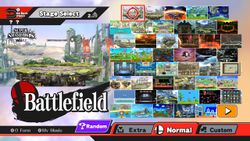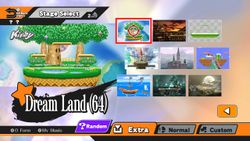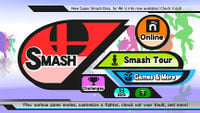| Welcome to SmashWiki! Log in or create an account and join the community, and don't forget to read this first! |
| Notices |
|---|
| The Skill parameter has been removed from Smasher infoboxes, and in its place are the new "Best historical ranking" and "Best tournament result" parameters. SmashWiki needs help adding these new parameters to Smasher infoboxes, refer to the guidelines here for what should be included in these new parameters. |
| When adding results to Smasher pages, include each tournament's entrant number in addition to the player's placement, and use the {{Trn}} template with the matching game specified. Please also fix old results on Smasher pages that do not abide to this standard. Refer to our Smasher article guidelines to see how results tables should be formatted. |
| Check out our project page for ongoing projects that SmashWiki needs help with. |
Super Smash Bros. for Wii U: Difference between revisions
m (Text replacement - "\[\[(:)?Image:" to "[[$1File:") |
No edit summary |
||
| (46 intermediate revisions by 29 users not shown) | |||
| Line 1: | Line 1: | ||
{{ | {{Title|''Super Smash Bros. for Wii U''}} | ||
{{ArticleIcons|ssb4-u=y}} | {{ArticleIcons|ssb4-u=y}} | ||
{{Infobox Game | {{Infobox Game | ||
| Line 22: | Line 22: | ||
'''''Super Smash Bros. for Wii U''''' ({{ja|大乱闘スマッシュブラザーズ for Wii U|Dairantō Sumasshu Burazāzu for Wii U}}, ''Great Fray Smash Brothers for Wii U'') is one of two games in the ''{{b|Super Smash Bros.|series}}'' series released as part of the ''[[Super Smash Bros. 4]]'' pair, and the home console counterpart to {{for3ds}}. Although most gameplay elements are shared between the two versions, there are several elements which distinguish the two. | '''''Super Smash Bros. for Wii U''''' ({{ja|大乱闘スマッシュブラザーズ for Wii U|Dairantō Sumasshu Burazāzu for Wii U}}, ''Great Fray Smash Brothers for Wii U'') is one of two games in the ''{{b|Super Smash Bros.|series}}'' series released as part of the ''[[Super Smash Bros. 4]]'' pair, and the home console counterpart to {{for3ds}}. Although most gameplay elements are shared between the two versions, there are several elements which distinguish the two. | ||
The game is playable on the [[Wii U]] with a variety of [[controller]] options, including the [[Wii U GamePad]], the [[Wii U Pro Controller]], the [[GameCube controller]] via an adapter, | The game is playable on the [[Wii U]] with a variety of [[controller]] options, including the [[Wii U GamePad]], the [[Wii U Pro Controller]], the [[GameCube controller]] via an adapter, or a [[Nintendo 3DS]] system running [[Super Smash Bros. for Nintendo 3DS|the 3DS version of Smash Bros. 4]] or the [[Smash Controller|Smash Controller]] software. | ||
''Super Smash Bros. for Wii U'' was officially released on November 21, 2014 in the Americas, and was followed by Europe on November 28, 2014, Australia and New Zealand on November 29, 2014, and Japan on December 6, 2014. | ''Super Smash Bros. for Wii U'' was officially released on November 21, 2014 in the Americas, and was followed by Europe on November 28, 2014, Australia and New Zealand on November 29, 2014, and Japan on December 6, 2014. As of the closure of the Wii U [[Nintendo eShop|eShop]] on March 27, 2023, it is no longer possible to officially digitally purchase this game or any of its post-launch {{b|downloadable content|SSB4}}. On October 4, 2023, Nintendo announced that online support for the Wii U would be ending during April 2024. As announced on January 24, 2024, online support for the Wii U ended on April 8, 2024, making it impossible to officially play ''Super Smash Bros. for Wii U'' online. | ||
==Opening movie== | ==Opening movie== | ||
| Line 57: | Line 57: | ||
*[[8-Player Smash]] | *[[8-Player Smash]] | ||
==Features | ==Features exclusive to the Wii U version== | ||
*The Wii U version is compatible with a set of [[amiibo]] figurines utilizing the Wii U GamePad and {{S|wikipedia|near field communication}}. By using their respective figurine, players can give an [[AI]] character [[Character customization|custom moves]] and level them up to level 50. The game is the first to utilize the GamePad's NFC function under the amiibo branding. | *The Wii U version is compatible with a set of [[amiibo]] figurines utilizing the Wii U GamePad and {{S|wikipedia|near field communication}}. By using their respective figurine, players can give an [[AI]] character [[Character customization|custom moves]] and level them up to level 50. The game is the first to utilize the GamePad's NFC function under the amiibo branding. | ||
* | **This was later added to the 3DS version via a post-launch update. | ||
*The Wii U version features different collectible [[trophies]] than the 3DS version, with a greater focus on elements from home console | *Due to its home console nature, the Wii U version lacks the optional dark outlines around playable characters present in the 3DS version, though still has the colored outlines for team battles. | ||
*The Classic mode is tournament styled, and no longer has three random options, only one. | |||
*The Wii U version features different collectible [[trophies]] than the 3DS version, with a greater focus on elements from home console releases. | |||
*The Wii U version sees the return of ''Brawl''{{'}}s [[My Music]] option, with a large selection of tracks available for each stage. | *The Wii U version sees the return of ''Brawl''{{'}}s [[My Music]] option, with a large selection of tracks available for each stage. | ||
*The Wii U version supports off TV play. | *The Wii U version supports off TV play. | ||
*Three exclusive new modes: Special Orders, 8-Player Smash, and Smash Tour. | *Three exclusive new modes: [[Special Orders]], [[8-Player Smash]], and [[Smash Tour]]. | ||
*The Trophy Box is exclusive to the Wii U version. | *The [[Trophy Box]] is exclusive to the Wii U version. | ||
**Additionally, three modes which were in ''Brawl'' but not in {{for3ds}}, Coin | **Additionally, three modes which were in ''Brawl'' but not in {{for3ds}}, [[Coin Battle]]s, [[Special Smash]] and [[Event Mode]], return. | ||
*Ness, Jigglypuff, Ganondorf and Bowser Jr. are starter characters, unlike in the 3DS version. | *Ness, Jigglypuff, Ganondorf and Bowser Jr. are starter characters, unlike in the 3DS version where they are unlockable. | ||
*[[Master Fortress]] appears in the Wii-U version, but is not in the 3DS version. | |||
== Demo == | ==Demo== | ||
A demo of the Wii U version was available at retail stores with a Wii U kiosk. It featured the entire starting roster of characters and stages, but like its 3DS counterpart, was locked to two minute time matches with items on for normal stages (but turned off for Ω stages). | A demo of the Wii U version was available at retail stores with a Wii U kiosk. It featured the entire starting roster of characters and stages, but like its 3DS counterpart, was locked to two minute time matches with items on for normal stages (but turned off for Ω stages). | ||
==Reception== | |||
The Wii U version received critical acclaim, with a Metacritic score of 92/100<ref>http://www.metacritic.com/game/wii-u/super-smash-bros-for-wii-u</ref> and a GameRankings score of 92.39%,<ref>http://www.gamerankings.com/wii-u/633202-super-smash-bros-for-wii-u/index.html</ref> being among the highest rated games of 2014, is also awarded the Metacritic's Game of the Year and the second-highest rated game of the series after ''[[Brawl]]''. The 2014 Video Game Awards even awarded the Wii U version with the "Best Fighting Game" award. The game was lauded for improving everything the 3DS version offered and significantly improving the online experience. The game has sold more than 5.38 million units as of September 30th, 2023.<ref>{{cite web|url=https://www.nintendo.co.jp/ir/en/finance/software/wiiu.html|title=IR Information:Top Selling Wii U Title Sales Unit|publisher=Nintendo|accessdate=2023-07-05}}</ref> | |||
In terms of tournament representation, this game is far more popular than {{for3ds}} due to being a home console game, a format the [[community]] greatly prefers over the handheld version. The high-definition graphics, simpler [[setup]] with less room for technical issues, and more customization options are greatly appreciated over the inherently more restrictive and and downgraded experience the [[Nintendo 3DS]] can offer. | |||
==In competitive play== | |||
{{main|Super Smash Bros. 4 in competitive play}} | |||
The Wii U version effectively replaced ''Brawl'' in terms of the competitive scene, with nearly all of the top players migrating over. The game also quickly overtook the 3DS version, making it the definitive version of ''Smash'' to play at the time. The divide between ''Melee'' and former ''Brawl'' players still existed, though the changes made in this game to bridge the gap between previous entries relieved the tension somewhat. [[Super Smash Bros. for Nintendo 3DS]] has arguably the smallest competitive scene of any game in the series. This is due to the community simply preferring the Wii U version as an avenue to play ''Smash''. | |||
The Wii U version continued the momentum of mainstream success started in ''Brawl'', such as a mainstage presence at [[EVO]] for many years and frequent references in other media like television series and internet websites. The game even helped retroactively bolster the popularity of previous entries, especially ''Smash 64'', which is still is increasing in popularity to this day. However, the game quickly fell off after the release of ''[[Super Smash Bros. Ultimate]]'', and now exists as a small niche community just like ''Brawl'' before it. | |||
The community has constructed a set of [[tournament legal (SSB4)|standard tournament rules]] to regulate tournament play. While rulesets may vary between different tournaments, generally universal gameplay rules include all matches being played via [[time]]d [[stock]] (2-3 stocks and 6-8 minutes), and restrictions on legal [[stage]]s. These regulations are enacted to ensure that gameplay at the highest level remains fair and interesting. | |||
==Staff== | ==Staff== | ||
| Line 85: | Line 101: | ||
<!--We do not need trivia about which characters are starters and which are not. Do not add it in.--> | <!--We do not need trivia about which characters are starters and which are not. Do not add it in.--> | ||
*This is the first time where [[Greninja]], [[Dark Pit]], [[Lucina]], [[Robin]], and [[Corrin]] appear on a home console. | *This is the first time where [[Greninja]], [[Dark Pit]], [[Lucina]], [[Robin]], and [[Corrin]] appear on a home console. | ||
*''Super Smash Bros. for Wii U'' is the first game in the series not to be released first in Japan. | *''Super Smash Bros. for Wii U'' is the first game in the series not to be released first in Japan. | ||
*''Super Smash Bros. for Wii U'' is | *''Super Smash Bros. for Wii U'' is the Wii U's [http://www.gamespot.com/articles/super-smash-bros-breaks-wii-u-sales-records/1100-6423811/ fastest selling title], surpassing the previous holder of the title, ''{{s|mariowiki|Mario Kart 8}}''. In North America alone, Nintendo sold over 490,000 digital and physical copies of the game in three days. | ||
**Sales of the | **Sales of the GameCube Bundle and Adapter were so popular in the United States that there was an immediate shortage of the Adapter upon launch of the game, leading to significantly inflated prices from online dealers; at one point, {{s|wikipedia|Amazon.com}} featured prices [http://arcadesushi.com/wii-u-gamecube-adapters-sold-out-everywhere-online-prices-skyrocket/ in excess of $110 USD] for the Adapter. | ||
* This is the only game in the series where all 12 characters from the original ''[[Super Smash Bros.]]'' are [[starter character|starters]], and by | *This is the only game in the series where all 12 characters from the original ''[[Super Smash Bros.]]'' are [[starter character|starters]], and by extension, the only one where [[Jigglypuff]], [[Bowser Jr.]] and [[Ganondorf]] are starters. | ||
*The game's Japanese release date happens to coincide with the birthday of late Nintendo president [[Satoru Iwata]]. | *The game's Japanese release date happens to coincide with the birthday of late Nintendo president [[Satoru Iwata]]. | ||
**November 21st, the game's North American release date, was also the release date of ''[[Super Smash Bros. Melee]]'' in Japan. | **November 21st, the game's North American release date, was also the release date of ''[[Super Smash Bros. Melee]]'' in Japan. | ||
| Line 98: | Line 111: | ||
*This is the only game in the series that has no unlockable {{uv|Pokémon}} characters. | *This is the only game in the series that has no unlockable {{uv|Pokémon}} characters. | ||
**This is also the first game in the series since ''Smash 64'' that has no unlockable {{uv|The Legend of Zelda}} characters. | **This is also the first game in the series since ''Smash 64'' that has no unlockable {{uv|The Legend of Zelda}} characters. | ||
*This is the only game in the series in which Vs. mode is not required for 100% completion. | *This is the only game in the series in which Vs. mode is not required for 100% completion, with no unlockable characters, stages, or even [[List of challenges (SSB4-Wii U)|challenges]] requiring it. | ||
*This is the only game to lack the appearance of a [[Fly Guy]]. | *This is the only game to lack the appearance of a [[Fly Guy]]. | ||
*This would be the last game in the series to have the announcer speaking between fights during the pre-match loading screens in Classic Mode. Starting in ''Ultimate'', the announcer's voice wouldn't be heard during the pre-match loading screens in Classic Mode. | *This would be the last game in the series to have the announcer speaking between fights during the pre-match loading screens in Classic Mode. Starting in ''Ultimate'', the announcer's voice wouldn't be heard during the pre-match loading screens in Classic Mode. | ||
*''Super Smash Bros. for Wii U'' is the game with the highest number of starters compared to the full roster, with them making up 84.31% of the base roster and 74.14% of the final post-DLC roster. | |||
==References== | ==References== | ||
Latest revision as of 18:14, December 20, 2024
| Super Smash Bros. for Wii U | |
|---|---|
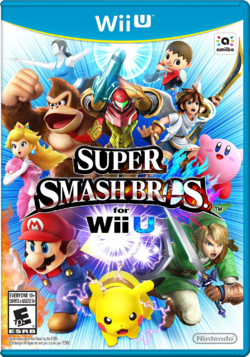 North American boxart. | |
| Developer(s) | Bandai Namco Sora Ltd. |
| Publisher(s) | Nintendo |
| Designer(s) | Masahiro Sakurai |
| Engine | Havok |
| Released | November 21, 2014 November 28, 2014 November 28, 2014 November 29, 2014 December 6, 2014 |
| Genre(s) | Fighting Platforming |
| Mode(s) | Single player, Multiplayer, Online multiplayer |
| Ratings | ESRB: E10+ PEGI: 12+ (provisional) |
Super Smash Bros. for Wii U (大乱闘スマッシュブラザーズ for Wii U, Great Fray Smash Brothers for Wii U) is one of two games in the Super Smash Bros. series released as part of the Super Smash Bros. 4 pair, and the home console counterpart to Super Smash Bros. for Nintendo 3DS. Although most gameplay elements are shared between the two versions, there are several elements which distinguish the two.
The game is playable on the Wii U with a variety of controller options, including the Wii U GamePad, the Wii U Pro Controller, the GameCube controller via an adapter, or a Nintendo 3DS system running the 3DS version of Smash Bros. 4 or the Smash Controller software.
Super Smash Bros. for Wii U was officially released on November 21, 2014 in the Americas, and was followed by Europe on November 28, 2014, Australia and New Zealand on November 29, 2014, and Japan on December 6, 2014. As of the closure of the Wii U eShop on March 27, 2023, it is no longer possible to officially digitally purchase this game or any of its post-launch downloadable content. On October 4, 2023, Nintendo announced that online support for the Wii U would be ending during April 2024. As announced on January 24, 2024, online support for the Wii U ended on April 8, 2024, making it impossible to officially play Super Smash Bros. for Wii U online.
Opening movie[edit]
The opening movie for Super Smash Bros. for Wii U is composed of footage from both gameplay and the various character introduction trailers shown since the game's reveal, barring the trailer for Duck Hunt.
Content[edit]
The playable roster is the same between both versions of SSB4.
Fighters[edit]
| Veterans (37) | |||||||||||||||
|---|---|---|---|---|---|---|---|---|---|---|---|---|---|---|---|
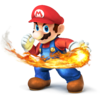 Mario |
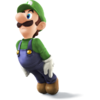 Luigi |
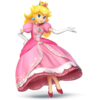 Peach |
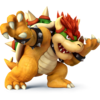 Bowser |
 Dr. Mario |
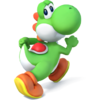 Yoshi |
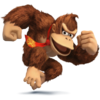 Donkey Kong |
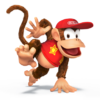 Diddy Kong | ||||||||
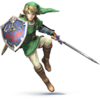 Link |
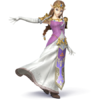 Zelda |
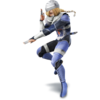 Sheik |
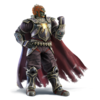 Ganondorf |
 Toon Link |
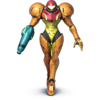 Samus |
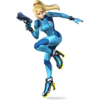 Zero Suit Samus |
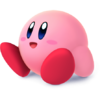 Kirby | ||||||||
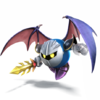 Meta Knight |
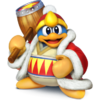 King Dedede |
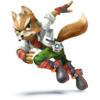 Fox |
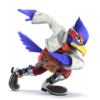 Falco |
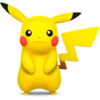 Pikachu |
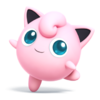 Jigglypuff |
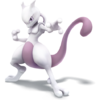 Mewtwo (DLC) |
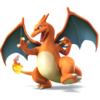 Charizard | ||||||||
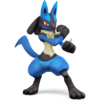 Lucario |
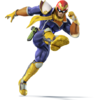 Captain Falcon |
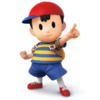 Ness |
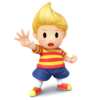 Lucas (DLC) |
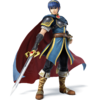 Marth |
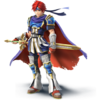 Roy (DLC) |
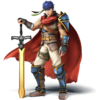 Ike |
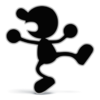 Mr. Game & Watch | ||||||||
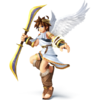 Pit |
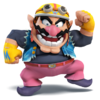 Wario |
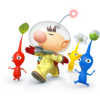 Olimar |
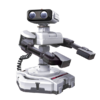 R.O.B. |
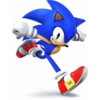 Sonic |
|||||||||||
| Newcomers (21) | |||||||||||||||
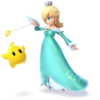 Rosalina & Luma |
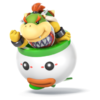 Bowser Jr. |
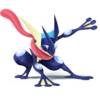 Greninja |
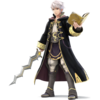 Robin |
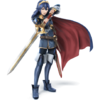 Lucina |
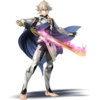 Corrin (DLC) |
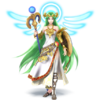 Palutena |
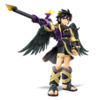 Dark Pit | ||||||||
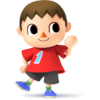 Villager |
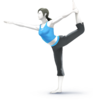 Wii Fit Trainer |
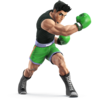 Little Mac |
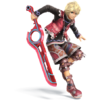 Shulk |
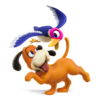 Duck Hunt |
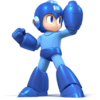 Mega Man |
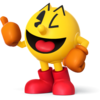 Pac-Man |
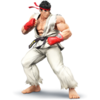 Ryu (DLC) | ||||||||
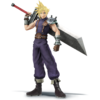 Cloud (DLC) |
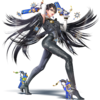 Bayonetta (DLC) |
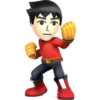 Mii Brawler |
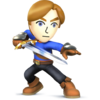 Mii Swordfighter |
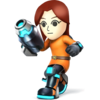 Mii Gunner |
|||||||||||
Bold denotes unlockable characters in both versions.
Bolded italics denote unlockable characters in the 3DS version only.
Stages[edit]
The two versions of SSB4 have separate sets of available stages; only 12 stages appear in both the Wii U and 3DS versions. The stages from the Wii U version are more heavily based on home console games. The Wii U version features a total of 55 stages (46 excluding DLC), consisting of 34 new stages and 21 familiar ones. The following stages are available in the Wii U version:
Bold denotes unlockable stages.
Single-player modes[edit]
Multiplayer modes[edit]
Features exclusive to the Wii U version[edit]
- The Wii U version is compatible with a set of amiibo figurines utilizing the Wii U GamePad and near field communication. By using their respective figurine, players can give an AI character custom moves and level them up to level 50. The game is the first to utilize the GamePad's NFC function under the amiibo branding.
- This was later added to the 3DS version via a post-launch update.
- Due to its home console nature, the Wii U version lacks the optional dark outlines around playable characters present in the 3DS version, though still has the colored outlines for team battles.
- The Classic mode is tournament styled, and no longer has three random options, only one.
- The Wii U version features different collectible trophies than the 3DS version, with a greater focus on elements from home console releases.
- The Wii U version sees the return of Brawl's My Music option, with a large selection of tracks available for each stage.
- The Wii U version supports off TV play.
- Three exclusive new modes: Special Orders, 8-Player Smash, and Smash Tour.
- The Trophy Box is exclusive to the Wii U version.
- Additionally, three modes which were in Brawl but not in Super Smash Bros. for Nintendo 3DS, Coin Battles, Special Smash and Event Mode, return.
- Ness, Jigglypuff, Ganondorf and Bowser Jr. are starter characters, unlike in the 3DS version where they are unlockable.
- Master Fortress appears in the Wii-U version, but is not in the 3DS version.
Demo[edit]
A demo of the Wii U version was available at retail stores with a Wii U kiosk. It featured the entire starting roster of characters and stages, but like its 3DS counterpart, was locked to two minute time matches with items on for normal stages (but turned off for Ω stages).
Reception[edit]
The Wii U version received critical acclaim, with a Metacritic score of 92/100[2] and a GameRankings score of 92.39%,[3] being among the highest rated games of 2014, is also awarded the Metacritic's Game of the Year and the second-highest rated game of the series after Brawl. The 2014 Video Game Awards even awarded the Wii U version with the "Best Fighting Game" award. The game was lauded for improving everything the 3DS version offered and significantly improving the online experience. The game has sold more than 5.38 million units as of September 30th, 2023.[4]
In terms of tournament representation, this game is far more popular than Super Smash Bros. for Nintendo 3DS due to being a home console game, a format the community greatly prefers over the handheld version. The high-definition graphics, simpler setup with less room for technical issues, and more customization options are greatly appreciated over the inherently more restrictive and and downgraded experience the Nintendo 3DS can offer.
In competitive play[edit]
The Wii U version effectively replaced Brawl in terms of the competitive scene, with nearly all of the top players migrating over. The game also quickly overtook the 3DS version, making it the definitive version of Smash to play at the time. The divide between Melee and former Brawl players still existed, though the changes made in this game to bridge the gap between previous entries relieved the tension somewhat. Super Smash Bros. for Nintendo 3DS has arguably the smallest competitive scene of any game in the series. This is due to the community simply preferring the Wii U version as an avenue to play Smash.
The Wii U version continued the momentum of mainstream success started in Brawl, such as a mainstage presence at EVO for many years and frequent references in other media like television series and internet websites. The game even helped retroactively bolster the popularity of previous entries, especially Smash 64, which is still is increasing in popularity to this day. However, the game quickly fell off after the release of Super Smash Bros. Ultimate, and now exists as a small niche community just like Brawl before it.
The community has constructed a set of standard tournament rules to regulate tournament play. While rulesets may vary between different tournaments, generally universal gameplay rules include all matches being played via timed stock (2-3 stocks and 6-8 minutes), and restrictions on legal stages. These regulations are enacted to ensure that gameplay at the highest level remains fair and interesting.
Staff[edit]
Gallery[edit]
A flourished excerpt of the Smash 4 theme that plays when starting the game from the Wii U HOME Menu or Quick Menu. It can also be heard on the 3DS upon highlighting either the game or the Smash Controller app from the HOME Menu.
Wii U version title screen.
Trivia[edit]
- This is the first time where Greninja, Dark Pit, Lucina, Robin, and Corrin appear on a home console.
- Super Smash Bros. for Wii U is the first game in the series not to be released first in Japan.
- Super Smash Bros. for Wii U is the Wii U's fastest selling title, surpassing the previous holder of the title, Mario Kart 8. In North America alone, Nintendo sold over 490,000 digital and physical copies of the game in three days.
- Sales of the GameCube Bundle and Adapter were so popular in the United States that there was an immediate shortage of the Adapter upon launch of the game, leading to significantly inflated prices from online dealers; at one point, Amazon.com featured prices in excess of $110 USD for the Adapter.
- This is the only game in the series where all 12 characters from the original Super Smash Bros. are starters, and by extension, the only one where Jigglypuff, Bowser Jr. and Ganondorf are starters.
- The game's Japanese release date happens to coincide with the birthday of late Nintendo president Satoru Iwata.
- November 21st, the game's North American release date, was also the release date of Super Smash Bros. Melee in Japan.
- Super Smash Bros. for Wii U is the first game since the original to lack a new stage from the F-Zero and EarthBound universes.
- This is the first game in the series where there is only one way to hear a character's Star KO scream (outside the Sound Test).
- This is the only game in the series that has no unlockable Pokémon characters.
- This is also the first game in the series since Smash 64 that has no unlockable The Legend of Zelda characters.
- This is the only game in the series in which Vs. mode is not required for 100% completion, with no unlockable characters, stages, or even challenges requiring it.
- This is the only game to lack the appearance of a Fly Guy.
- This would be the last game in the series to have the announcer speaking between fights during the pre-match loading screens in Classic Mode. Starting in Ultimate, the announcer's voice wouldn't be heard during the pre-match loading screens in Classic Mode.
- Super Smash Bros. for Wii U is the game with the highest number of starters compared to the full roster, with them making up 84.31% of the base roster and 74.14% of the final post-DLC roster.
References[edit]
- ^ Facebook Wii U Italia - https://www.facebook.com/WiiUItalia/posts/697289303700437
- ^ http://www.metacritic.com/game/wii-u/super-smash-bros-for-wii-u
- ^ http://www.gamerankings.com/wii-u/633202-super-smash-bros-for-wii-u/index.html
- ^ IR Information:Top Selling Wii U Title Sales Unit. Nintendo. Retrieved on 2023-07-05.
| hide Super Smash Bros. series | |
|---|---|
| Super Smash Bros. · Super Smash Bros. Melee · Super Smash Bros. Brawl · Super Smash Bros. 4 (for Nintendo 3DS · for Wii U) · Super Smash Bros. Ultimate |
